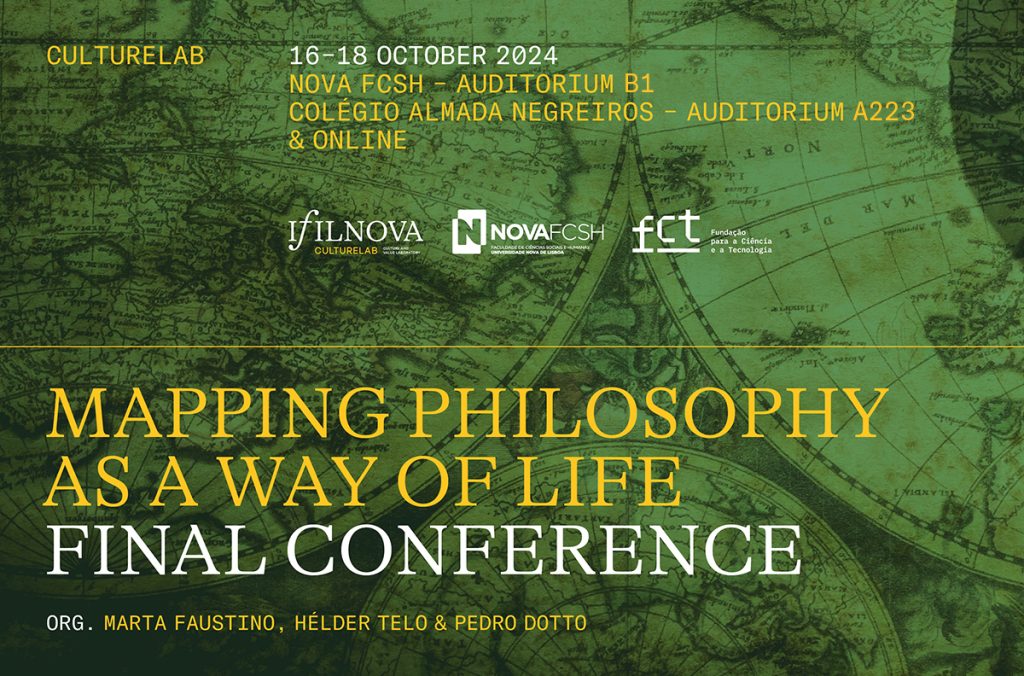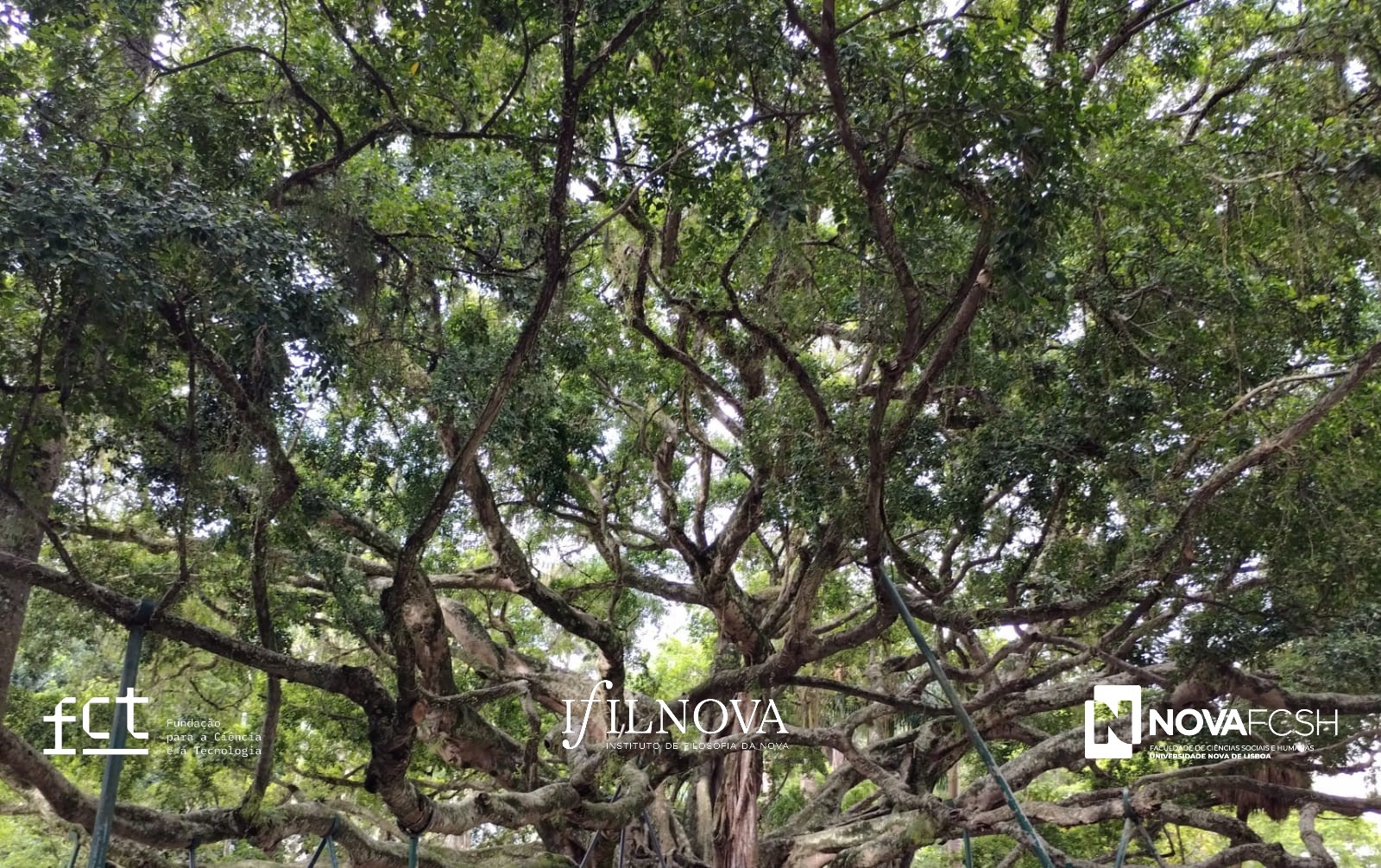MAPPING PHILOSOPHY AS A WAY OF LIFE Final Conference
IFILNOVA / NOVA University of Lisbon
NOVA-FCSH (Auditorium B1), Colégio Almada Negreiros (Auditorium A223) & Online
October 16-18, 2024
Org. Marta Faustino, Hélder Telo & Pedro Dotto

The final conference of the project «Mapping Philosophy as a Way of Life: An Ancient Model, A Contemporary Approach» will bring together team members, consultants, and collaborators of the project in order to present the most significant results achieved in the last two years. In line with the project’s main objective, the conference will map the vibrant and multifaceted field of philosophy as a way of life (PWL) and present for the first time the main contents of the upcoming Oxford Handbook of Philosophy as a Way of Life. In doing so, it aims to provide an up-to-date overview of the leading research trends in the field while also discussing new avenues of inquiry, use, and application of PWL.
Presentations will focus on the three main trends of research and application of PWL in current philosophical debate:
1. Questions and Controversies
As a metaphilosophical model that contrasts and competes with others, PWL has renewed reflection on the very nature and role of philosophy. This involves not only discussion about what philosophy as a way of life is and what distinguishes it from other ways of conceiving philosophy—a question regarding which consensus has not yet been reached—but also addressing some of the controversial distinguishing hallmarks of the notion, most notably the very definition of PWL, the complex relationship between theory and practice (including the alleged privilege of the latter over the former in PWL), the idea that the philosophical life is necessarily preceded by an existential choice, the specificity of PWL when compared to other forms of spirituality (in particular, religion), and the much-contested possibility of applying the model to post-Antiquity philosophers.
2. History
According to Pierre Hadot, Michel Foucault, and other scholars working in their wake, the practical and existential dimension that characterized Greco-Roman philosophy can also be found in several modern and contemporary authors who revived its practical, concrete, and self-transformative orientation. At the same time, it has often been noted how the same performative and self-transformative orientation is at the core of other philosophical or spiritual traditions, such as Hinduism, Taoism, or Buddhism. In this light, PWL appears not simply as a characterization of ancient philosophy but also as a specific metaphilosophical model that has characterized a good part of the history of philosophy and can be fruitfully used to (re)read this history in an alternative and illuminating way. As a model that brings philosophy’s practical, performative, and self-transformative potential to the fore, it allows not only for a different and more complex understanding of what Western philosophy looked like throughout its history but also for a crucial intercultural dialogue with other philosophical cultures that share similar traits and understanding of the nature and function of philosophy.
3. Uses and Applications
In the last few years, we have witnessed a proliferation of activities and publications, as well as networks and research projects designed to apply the PWL approach to a variety of knowledge domains that go beyond the academic world—such as management studies, psychotherapy, mental health and contemplative studies—and also to some of the most challenging questions and problems of our time such as feminism, global conflict, and ecology. This shows how PWL’s focus on ethical transformation and practice can render philosophy particularly useful in dealing with contemporary issues, problems, and challenges. We will thus offer an overview of some of the possible applications of PWL, thereby showing how PWL is not just a scholarly, abstract field (focused exclusively on how to interpret the history of philosophy) but also an approach that is being usefully applied to other fields of human activity.
The conference will take place in a hybrid format. The speakers who will give their talk remotely are marked with an asterisk (*) below.
Confirmed Speakers
- Douglas Anderson (Southern Illinois University Carbondale) *
- Stephen Angle (Wesleyan University) *
- Jennifer Baker (College of Charleston)
- Michael Chase (CNRS Centre Jean Pépin)
- Caleb Cohoe (Metropolitan State University of Denver)
- Simone D’Agostino (Pontifical Gregorian University)
- Marc-Henri Deroche (Kyoto University) *
- William Desmond (Maynooth University) *
- Michael Fagenblat (Open University, Israel) *
- Marta Faustino (Nova University of Lisbon)
- Gianfranco Ferraro (Open University, Lisbon)
- Marc-Antoine Gavray (Université de Liège)
- Eli Kramer (University of Wrocław)
- Pablo Lamberti (University of Amsterdam)
- Annie Larivée (Carleton University)
- Jaco Louw (Stellenbosch University) *
- Laura Anna Macor (Università degli Studi di Verona)
- John Marenbon (Trinity College, Cambridge) *
- Laura Mueller (West Texas A&M University)
- Pawel Odyniec (Karlstad University, Sweden)
- Guy du Plessis (Utah State University / Loyola University Chicago) *
- Lisa Raphals (University of California Riverside) *
- Bartholomew Ryan (Nova University of Lisbon) *
- Matthew Sharpe (Australian Catholic University) *
- Richard Shusterman (Florida Atlantic University) *
- John Sellars (Royal Holloway, University of London)
- Matteo Stettler (Università di Bologna)
- Hélder Telo (Universidade da Beira Interior)
- Simone Webb (University of Sussex)
- Daniel Louis Wyche (Columbia University, New York) *
Programme
(Times in UTC+1 / Lisbon time)
DAY 1 – 16 October | NOVA-FCSH (Auditorium B1)
| 9:00 | Reception |
| 9:20 | Opening |
| 9:40-11:00 | SESSION 1 | Chair: Matteo Stettler Matthew Sharpe: “Philosophy as a Way of Life as a Distinctive Metaphilosophy” [online] Marta Faustino: “Theory vs Praxis in Philosophy as a Way of Life” |
| 11:00 | Coffee break |
| 11:30-12:50 | SESSION 2 | Chair: Laura Mueller Eli Kramer & Matteo Stettler: “Philosophy as a Way of Life and Existential Choice” Gianfranco Ferraro: “Philosophy as a Way of Life, Spirituality and Religion” |
| 13:00 | Lunch |
| 14:30-16:30 | SESSION 3 | Chair: Hélder Telo Annie Larivée: “Philosophy as a Way of Life in Classical Antiquity” William Desmond: “Philosophy as a Way of Life in the Hellenistic Schools” [online] Marc-Antoine Gavray: “Philosophy as a Way of Life in Neoplatonism” |
| 16:30 | Coffee break |
| 17:00-18:20 | SESSION 4 | Chair: Annie Larivée Caleb Cohoe: “Philosophy as a Way of Life in Early Christianity” John Marenbon: “Philosophy as a Way of Life in the Middle Ages” [online] |
DAY 2 – 17 October | Colégio Almada Negreiros (Auditorium A223)
| 9:00-11:00 | SESSION 5 | Chair: Gianfranco Ferraro John Sellars: “Philosophy as a Way of Life in Renaissance Humanism” Simone D’Agostino: “Philosophy as a Way of Life in Early Modern Philosophy” Laura Anna Macor: “Philosophy as a Way of Life in the Enlightenment” |
| 11:00 | Coffee break |
| 11:30-12:50 | SESSION 6 | Chair: Simone Webb Bartholomew Ryan: “Philosophy as a Way of Life in 19th Century Existential Philosophy” [online] Hélder Telo: “Philosophy as a Way of Life in Phenomenology and 20th Century Existential Philosophy” |
| 13:00 | Lunch |
| 14:30-15:50 | SESSION 7 | Chair: Laura Macor Douglas Anderson: “Philosophy as a Way of Life in American Transcendentalism” [online] Richard Shusterman: “Philosophy as a Way of Life in Pragmatism” [online] |
| 15:50 | Coffee break |
| 16:20-18:20 | SESSION 8 | Chair: Pedro Dotto Pawel Odyniec: “Philosophy as a Way of Life in Hindu Philosophy” Michael Fagenblat: “Philosophy as a Way of Life in Jewish Philosophy” [online] Lisa Raphals: “Philosophy as a Way of Life in Daoist Philosophy” [online] |
DAY 3 – 18 October | NOVA-FCSH (Auditorium B1)
| 9:00-11:00 | SESSION 9 | Chair: Luís de Sousa Stephen Angle: “Philosophy as a Way of Life in Confucian Philosophy” [online] Marc-Henri Deroche: “Philosophy as a Way of Life in Buddhist Philosophy” [online] Jaco Louw: “Philosophy as a Way of Life in African Philosophy” [online] |
| 11:00 | Coffee break |
| 11:30-12:50 | SESSION 10 | Chair: Eli Kramer Laura Mueller: “Philosophy as a Way of Life and Education” Pablo Lamberti: “Philosophy as a Way of Life and Environmental Ethics” |
| 13:00 | Lunch |
| 14:30-16:30 | SESSION 11 | Chair: Pawel Odyniec Jennifer Baker: “Philosophy as a Way of Life and Management Studies” Simone Webb: “Philosophy as a Way of Life and Feminism” Daniel Wyche: “Philosophy as a Way of Life and Global Political Challenges” [online] |
| 16:30 | Coffee break |
| 16:30-18:20 | SESSION 12 | Chair: Marta Faustino Guy du Plessis: “Philosophy as a Way of Life and Psychotherapy” [online] Michael Chase: “Philosophy as a Way of Life and Contemplative Studies” |
| 18:30 | Closing remarks |
Attendance is free, but registration is required via this form.
